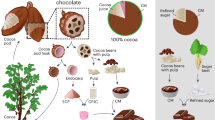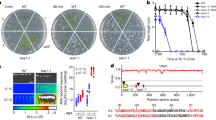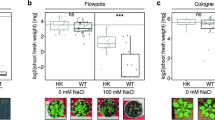Abstract
PECTIC acid (polygalacturonic acid) lyase (EC 4.2.2.2., PAL) formed in bacteria, catalyses the transeliminative cleavage of pectic acid1. Because PAL both macerates plant tissues and causes cell leakage and death2,3, it has often been investigated biochemically from the industrial and plant pathological point of view. Physiological studies, however, have been limited, probably because PAL is in part an extracellular enzyme4. Thus most studies of its inducibility have compared activities in filtrates of cells cultured on different carbon sources5,6. But assay of an extracellular enzyme does not necessarily reveal changes in its rate of synthesis. In Erwinia carotovora, however, the PAL that can be purified from cell-free extracts is probably the same protein as the extracellular enzyme1. In strain EC-1 of E. carotovora, non-induced PAL activity is three to four times greater in cell-free extracts than in the culture filtrate during log phase growth, and the relative rate of increase of intracellular enzyme activity after induction is 130 times greater than the rate of release of PAL into the culture filtrate (unpublished data). I therefore used this strain to study induction by measuring PAL activities in cell-free extracts. I report here that the inducer of PAL in E. carotovora may not be pectic acid itself but its breakdown product.
This is a preview of subscription content, access via your institution
Access options
Subscribe to this journal
Receive 51 print issues and online access
$199.00 per year
only $3.90 per issue
Buy this article
- Purchase on Springer Link
- Instant access to full article PDF
Prices may be subject to local taxes which are calculated during checkout
Similar content being viewed by others
References
Moran, F., Nasuno, S. & Starr, M. P. Arch. Biochem. Biophys. 123, 298–306 (1968).
Mount, M. S., Bateman, D. F., Basham, H. G. Phytophology 60, 924–931 (1970).
Hall, J. A. & Wood, R. K. S. Nature 227, 1226 (1970).
Dean, M. & Wood, R. K. S. Nature 214, 408–410 (1967).
Zucker, M. & Hankin, L. J. Bact. 104, 13–18 (1970).
Macmillan, J. D. & Vaughn, R. H. Biochemistry, 3, 564–572 (1964).
Mikula, J. W., Stieglitz, B. I. & Calvo, J. M. J. Bact. 109, 584–593 (1972).
Weissbach, A. & Hurwitz, J. J. biol. Chem. 234, 705–709 (1959).
Okamoto, K., Hatanaka, C. & Ozawa, J. Agric. biol. Chem. 28, 331–336 (1964).
Goto, M. & Okabe, N. Ann. Phytopathol. Sac. Jap. 27, 1–9 (1962).
Preiss, J. and Ashwell, G. J. biol. Chem 238, 1571–1576 (1963).
Hatanaka, C. & Ozawa, J. Agric. biol. chem. 36, 2307–2313 (1972).
Platt, T., Müller-Hill, B. & Miller, J. H. in Experiments in MoIecular Genetics (ed. Miller, J. H.) 358 (Cold Spring Harbor Laboratory, New York, 1972).
Lowry, O. H., Rosebrough, N. J., Farr, A. J. & Randall, R. J. J. biol. Chem. 193, 265–275 (1951).
Author information
Authors and Affiliations
Rights and permissions
About this article
Cite this article
TSUYUMU, S. Inducer of pectic acid lyase in Erwinia carotovora. Nature 269, 237–238 (1977). https://doi.org/10.1038/269237a0
Received:
Accepted:
Issue Date:
DOI: https://doi.org/10.1038/269237a0
This article is cited by
-
Quorum sensing as a target for developing control strategies for the plant pathogen Pectobacterium
European Journal of Plant Pathology (2007)
-
Flagella-mediated motility is required for biofilm formation by Erwinia carotovora subsp. carotovora
Journal of General Plant Pathology (2006)
-
Expression of pehA-bla gene fusions in Erwinia carotovora subsp. carotovora and isolation of regulatory mutants affecting polygalacturonase production
Molecular and General Genetics MGG (1992)
-
Characterization of a genomic clone of Erwinia carotovora subsp. carotovora TG3 encoding a pectolytic enzyme of apparent molecular weight 78 kDa
Molecular and General Genetics MGG (1987)
-
The effect of wound healing and of certain chemicals on electrolyte release from discs of potato by enzymes ofErwinia carotovora
Potato Research (1984)
Comments
By submitting a comment you agree to abide by our Terms and Community Guidelines. If you find something abusive or that does not comply with our terms or guidelines please flag it as inappropriate.



